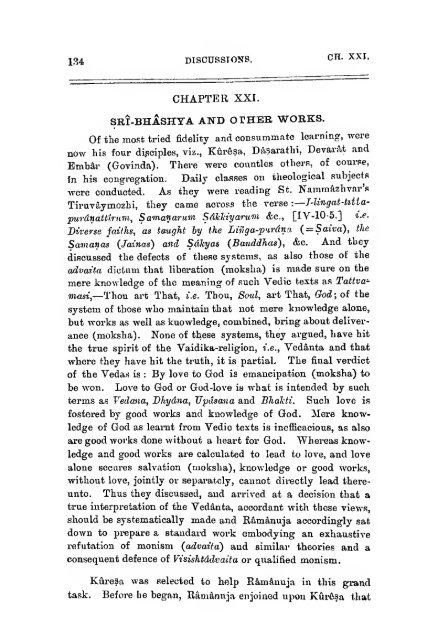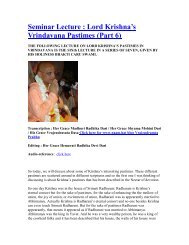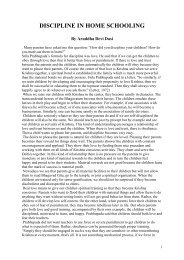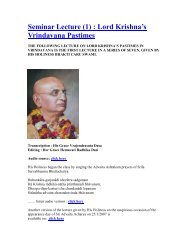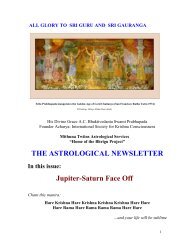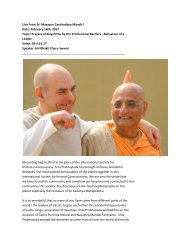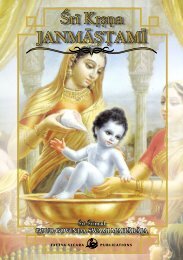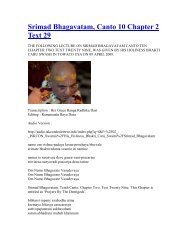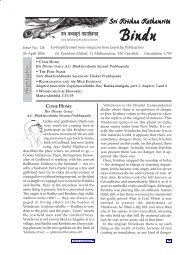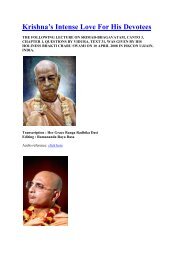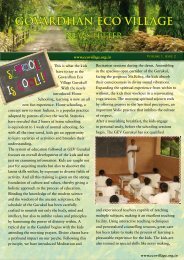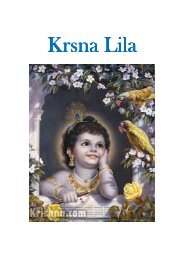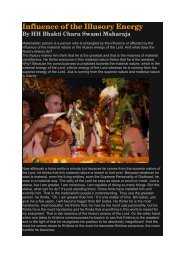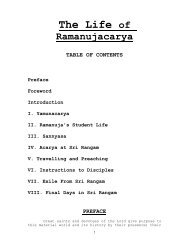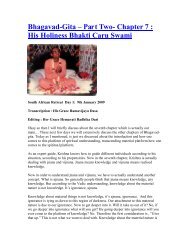the exponent of the Visishtadvaita philosophy - ebooks - ISKCON ...
the exponent of the Visishtadvaita philosophy - ebooks - ISKCON ...
the exponent of the Visishtadvaita philosophy - ebooks - ISKCON ...
You also want an ePaper? Increase the reach of your titles
YUMPU automatically turns print PDFs into web optimized ePapers that Google loves.
—<br />
134 DISCUSSIONS. Cn. XXI.<br />
CHAPTER XXI.<br />
SBI-BHASHTA AND OTHEE WORKS.<br />
Of <strong>the</strong> most tried fidelity and consummate learning, were<br />
now his four di.sciples, viz., Kurfesa, Dasarathi, Devarat and<br />
Emb&r (Govinda). There were countle.s o<strong>the</strong>rs, <strong>of</strong> course,<br />
in his congregation. Daily classes on <strong>the</strong>ological subjects<br />
were conducted. As <strong>the</strong>y were reading St. Nammazhvar's<br />
TiruTaymozhi, <strong>the</strong>y came across <strong>the</strong> verse T-lingat-t.iUa-<br />
:<br />
purdnattiruvi, Samanarum Sdkh'yaruin &c., [IV-10-5.] i.e.<br />
Diverse faiths, as taught by <strong>the</strong> Liiiga-jJ'irdnci { = Saiva), <strong>the</strong><br />
Savianas {Jainas) and Sdkyas (Batiddhas), &c. And <strong>the</strong>y<br />
discussed <strong>the</strong> defects <strong>of</strong> <strong>the</strong>se systems, as also those <strong>of</strong> <strong>the</strong><br />
advaita dictum that liberation (moksha) is made sure on <strong>the</strong><br />
mere knowledge <strong>of</strong> <strong>the</strong> meaning <strong>of</strong> such Vedie texts as Tattvamasi,—Thou<br />
art That, i.e. Thou, Soul, art That, Ood ; <strong>of</strong> <strong>the</strong><br />
system <strong>of</strong> those who maintain that<br />
not mere knowledge alone,<br />
but works as well as knowledge, combined, bring about deliverance<br />
(moksha). None <strong>of</strong> <strong>the</strong>se systems, <strong>the</strong>y argued, have hit<br />
<strong>the</strong> true spirit <strong>of</strong> <strong>the</strong> Vaidika-religion, i.e., Vedanta and that<br />
where <strong>the</strong>y have hit <strong>the</strong> truth, it is partial. The final verdict<br />
<strong>of</strong> <strong>the</strong> Vedas is : By love to God is emancipation (moksha) to<br />
be won. Love to God or God-love is what is intended by such<br />
terms as Vedana, Dhydna, Updsana and BhaJifi. Such love is<br />
fostered by good works and knowledge <strong>of</strong> God. Mere knowledge<br />
<strong>of</strong> God as learnt from Vedie texts is ineSicacious, as also<br />
are good works done without a heart for God. Whereas knowledge<br />
and good works are calculated to lead to love, and love<br />
alone secures salvation (moksha), knowledge or good works,<br />
without love, jointly or separately, cannot directly<br />
lead <strong>the</strong>reunto.<br />
Thus <strong>the</strong>y discussed, and arrived at a decision that a<br />
true interpretation <strong>of</strong> <strong>the</strong> Vedanta, accordant with <strong>the</strong>se views,<br />
should be systematically made and E.£Lm8lnuja accordingly sat<br />
down to prepare a standard work embodying an exhaustive<br />
refutation <strong>of</strong> monism {advaita) and similar <strong>the</strong>ories and a<br />
consequent defence <strong>of</strong> Visishtddvaita or qualified monism.<br />
KureSa was selected to help Kamanuja in this grand<br />
task. Befoi-e he began, Ramajnuja enjoined upon Kurfiaa that


